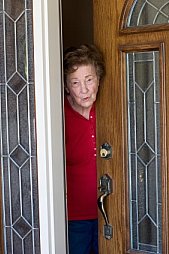Crime Survivors
& Victims' Loved Ones
Recap
Crime Survivors' Unwanted Memories Jim Smith is still haunted by memories of when he was beaten and robbed in his Orlando FL apartment. He moved out the next day. His ongoing nightmares prompted him to seek crime survivor counseling for Post Traumatic Stress Disorder (PTSD).
~~~
An intruder broke into her Edmonton apartment, raped her and slashed her throat and severed two of her fingers before she managed to escape. Ever since, she’s suffered from extreme PTSD. She feels under constant threat with intense flashbacks and nightmares. She feels a psycho is always waiting to kill her.
~~~
Tommie Nell Hannaford says an attempted carjacking in
Jackson MS has changed her life forever. Recovery from PTSD can last a lifetime. The more a person ignores
their feelings, the more chance it could lead to depression, heart
disease, and drug abuse or alcoholism.
Rape survivors can find insights at Rape Survivors. Crime survivors can find PTSD counseling, and murder victims' loved ones can find grief counseling.
COUNSELING RESOURCES
Many kind souls will help you cope with PTSD and grief. Start searching with your church or sheriff or police department. Ask them to connect you with a victims' services PTSD or grief counselor.
Or search the internet for "victim services" (and your town or county) to find a grief counselor.
There are also countless support groups worldwide for survivors of crime. The several listed below are located in the US, the UK, and
Australia. Wherever you’re located, contact any or all of them. They'll try to refer you to a group near you for counseling.
• Victim Support at www.victimsupport.org.uk
• Parents of Murdered Children (POMC) at www.pomc.com.
• Witness Justice at www.witnessjustice.org
• Michigan Victim Alliance at www.mivictims.org.
• Compassionate Friends at compassionatefriends.org.
• Enough Is Enough at www.enoughisenough.org.au.
BOOKS
Grieving crime survivors (or anyone who lost a loved one) might find the following books helpful. Go to www.amazon.com, choose a “Books” search, and copy/paste in one of the following titles:
• Chicken Soup for the Grieving Soul: Stories About Life, Death and Overcoming the Loss of a Loved One
• Chicken Soup for the Soul: Grieving and Recovery: 101 Inspirational
and Comforting Stories about Surviving the Loss of a Loved One
• I Wasn't Ready to Say Goodbye: Surviving, Coping and Healing After the Sudden Death of a Loved One
• The Other Side of Sadness: What the New Science of Bereavement Tells Us About Life After Loss
Check Amazon's Reviews Before Buying
Before buying any book, read Amazon's 1-Star reviews - the least favorable. Always remember that 5-Star reviews are often just glowing hype written by the author's friends and family, etc., while the 1-Star reviews are more honest. By reading both the good and the bad, you'll get a more balanced view of whether that book might suit your needs.
Links to Grieving Advice
• The Radical Act of Letting Things Hurt: How (Not) to Help a Friend in Sorrow
• 7 words to help someone going through a crisis
• 40 Thoughtful Condolence Messages to Send to Family or Friends
•
Four Ways to Make Grief More Bearable
• Why I Couldn’t Get Over My Brother’s Death
• How Long Should It Take to Grieve? Psychiatry Has Come Up With an Answer. The latest edition of the DSM-5, sometimes known as “psychiatry’s bible,” includes a controversial new diagnosis: prolonged grief disorder.
~~~
“We are never finished with grief. It is part of the fabric of living. It is always waiting to happen. Love makes memories and life precious; the grief that comes to us is proportionate to that love and is inescapable.” – V. S. Naipaul
What do you do when you run out of tears?
There is a light at the end of the tunnel. Even when your heart is shattered, you will almost certainly survive. Almost everyone does. Our survival instinct is inborn.
Friends and family are inherently drawn to soothe the grieving, but they soon exhaust their handful of comforting platitudes and feel helpless themselves. And few of us can endure more than a short time trying to console the inconsolable.
If the bereaved can occasionally shake off their grief, then others will be better able to help them escape from suffering alone. Eventually, the endless cycle of grief will lessen and a new purpose in life will have a chance to take root.









